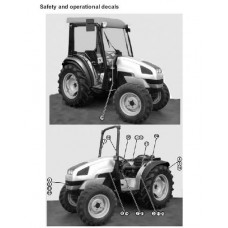Shopping Cart
0 item(s) - 0.00€- Allis-Chalmers (28)
- Atlas (103)
- Case International (46)
- Claas (3)
- David Brown (17)
- Deutz (168)
- Deutz Diesel Engine (23)
- Fendt (44)
- Fiat (92)
- Ford (61)
- Holder (22)
- John Deere (135)
- Komatsu (117)
- Kubota (114)
- Lanz (3)
- MAN (2)
- Massey Ferguson (42)
- Mc Cormick International (47)
- New Holland (60)
- Renault (1)
- Same (3)
- Steyr (6)
- Terex (6)
- Valtra (4)
Same Solaris 35 - Solaris 45 - Solaris 55 Operators Manual
Add to Compare
Operators and Maintenance Manual
Same Solaris 35
Same Solaris 45
Same Solaris 55
288 pages
Language: English
You will receive the downloadlink of the digital manual (pdf) in your email account after your payment
Contents:
Preface
Table of contents
Important
Safety
Introduction to Safety
Safety
AWord to the Operator
Danger, Warning, Caution
Follow a Safety Programme
For Safe Operation
General safety rules
Protective Structures
Roll Over Protective Structures
Operation
Damage to the ROPS
Cab
Prepare for Safe Operation
Protect Yourself
Risks from exposure to noise
Know Your Equipment
Use all Available Protective and Safety Devices
Check the Equipment
Clean the Tractor
Protect the Environment
Servicing the Tractor
Starting
Warn Personnel before Starting
Mount and Dismount Safely
Start Safely
Follow Recommended Starting Procedures
Test the Controls
Starting Fluid
Work Safely
Making the Right Moves
Follow Safe Operating Practices
Watch out for Others
Risk of Overturning
To Avoid Side Overturns
To Avoid Rear Overturns
General Operating Hazards
Implements and Attachments
Safety - Towing
Road Transport
Rules of the Road
After Operation
Welding work on the tractor body
Safety instructions for the installation of supplementary equipment and/or electronic components
Safety and operational decals
International symbols (Part. 1)
International symbols (Part. 2)
International symbols (Part. 3)
Metric conversion
Conversion tables
Replacement parts
Tractor serial number
Engine serial number
Tractor identification plate
Original replacement parts
Use
Checking the tractor prior to starting work
Refuelling
Checking the engine oil level
Access to the driving position
Lights' switch
Instrument panel
Fuel gauge
Engine temperature gauge
Tachometer
Pilot lights'
Warning light
Front/rear differential lock button
Emergency flashers control
Hand accelerator
Ignition switch
Engine
Precautions for optimum engine performance
Starting the engine
Electronic control of engine cooling system
Engine shut down
Cold starting
Emergency starting through auxiliary battery
Turbocharging
Manual emergency stop
Adjusting the driver’s seat
BOSTROM Minibaltic XH2 seat with spring suspension
KAB P4 XH2 sprung seat
Adjusting the rearview mirrors
Control pedals
Clutch control pedal
Brake pedal
Handbrake lever
Accelerator pedal
Gearbox and P.T.O. clutch
Controls located to the right of the driver
Gearbox controls
Transmission speed selection
Front and rear differential lock
Front-wheel drive
Power take-off
Front P.T.O. (1000 rpm)
Rear - central PTO
Synchronized power take-off
Underside P.T.O. for control of implements mounted underside
Rear brakes
Load sensing - mechanical lift
Controls
Hydraulic system
Auxiliary hydraulic services control valve
Nomenclature
Types of auxiliary hydraulic service control valve
The controls
Example connection and operation of a double-acting cylinder
Connection of an implement to the auxiliary
hydraulic service couplers
Converting a control valve from double-acting to single-acting
Example of connection to a single-acting cylinder
Class “A” drawbar
Towing hitch
Class “C” towing hitch
CEE towing hitch
Three-point linkage
Adjustment of the telescopic stabilisers
Adjustment of the top link
Adjustable vertical link
Mid mount implements with lifting arms
Hydraulic front lift
Bodywork
Safety frame
Cab
GRAMMER MSG 83/8 type seat
Ventilation
Controls
Heating system
Air conditioning
Controls located in the cab roof lining
Opening front window
Opening rear window
Cab roof light
Storage compartment
Digital quartz clock
Active carbon air filter
Cable channel for passing external implement control
cables into the cab
Hazard warning triangle
Screen wash liquid reservoir
Wheels
Track adjustment
Tyre inflation pressures
Width of the front axle (without wheels)
Mechanical ratio (front wheel revolutions / rear wheel revolution)
Width of rear axle (without wheels)
Row crop tires
Running direction of tires
Adjusting steering stops
Adjustable track wheels
Permissible tyre combinations
Track width adjustment for wheels with adjustable rims
Front wheels
Rear wheels
Track width adjustment for wheels with fixed rims
Ballast
Front horizontal ballast blocks
Rear ballast
Ballasting by filling the tyres with water + antifreeze solution
Filling the tyre with water
Draining water from the tyre
Maintenance operations
Lubricants and fluids
Maintenance intervals
Maintenance and inspection schedule
Fuel storage
Refueling
Refueling at the end of the day
Engine maintenance
Raising the engine hood
Cleaning the front grille
Checking the engine oil level
Changing the engine oil
Changing the engine oil filters
Cleaning and replacement of the fuel filter
Bleeding air from the fuel system
Electro-magnetic fuel pump
Filter periodic maintenance
Filter replacement
Filter inspection and cleaning
Fuel
Air filter
Cleaning the air filter
Engine cooling system
Checking the level of coolant in the expansion tank
AKROS FREEZE liquid coolant
Changing the coolant/antifreeze mixture and flushing the
cooling system
Thermostat
Cleaning the oil cooler
Adjusting belt tension
Gearbox clutch
Rear and underside P.T.O. clutch
Maintenance of the gearbox, differential and rear reduction units
Checking the transmission oil level
Changing the oil
Maintenance of the hydrostatic power steering
Bleeding air from the hydraulic system
Checking operation of the differential lock controls
Maintenance of the front and rear brakes
Checking the braking action
Front differential lock (if installed)
Maintenance of the front wheel drive system
Front axle and hub final drives (4WD)
Front axle pivot bushes
Maintenance of hydraulic power-lift
Maintenance of the 3-point linkage
Rear 3-point linkage
Maintenance of Front P.T.O
Maintenance of front lift
Windscreen washer
Windscreen and rear screen wipers
Maintenance of the air conditioning system
Cab air filter (cleaning)
Active carbon air filter
Maintenance of the heating system
Maintenance of the air conditioning system
Checking the air conditioning system
Air conditioning system compressor
Air conditioning system
Air conditioning system recharging and maintenance valve
General cleaning of the tractor
Cleaning with detergents
Cleaning with compressed air
Electrical system
Battery
Checking the battery
Fuse box
List of electrical system components
Fuse box
Connector for connection to front wiring loom
Connector for connection to rear wiring loom
Cab electrical system wiring
Electrical diagram - cab air conditioning unit
Cab fuse box
Rear outlet socket - standard
Cab electrical system wiring
Wiring for cab air conditioning unit
Wiring for radio
Wiring for cab
Wiring for worklights
Lights
Cleaning the headlights and sidelights
Bulb replacement
Rear light assemblies
Front sidelights and direction indicators mounted on the sides of the tractor
Front and rear working lights in cab roof
Interior light
Rear work lights for tractors with platform
Headlight alignment
Horizontal adjustment
Vertical adjustment
Storage of the tractor
Operations prior to garaging the tractor for a long period
Preparing the tractor for use after a long period of storage
Technical specifications
Engine
Clutch
Power take-off
Gearbox
Gearbox ratios schematic
Performance - Ground speed in km/h (mph) @ 3000 rpm
Front driving axle
Hydrostatic steering system
Front hydraulic lift
Hydraulic diagram of lift
Hydrostatic steering system
Cab
Dimensions and weights
Unladen weight of tractor (without ballast)
Unladen weight of tractor (with ballast)
Maximum permissible loads
Maximum trailerable loads
Ballast weights
Attachment of implements to the tractor
Implement attachment points
Fault diagnosis
Engine
Gearbox
Rear power take-off
Front driving axle
Brakes
Hydraulic lift
Auxiliary hydraulic systems
Appendix
Combination of tractor and mounted implement
Determination of the total weight, the axle loads, the tyre load carrying capacity and the necessary minimum ballasting
Consideration of rear mounted implement and front/rear combinations
Front mounted implement
Note





